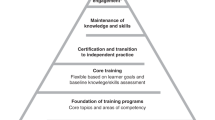Abstract
Background
The American Academy of Neurology (AAN) has established a core curriculum of topics for residency training in neurocritical care. At present there is limited data evaluating neurology residency education within the neurological intensive care unit. This study evaluates learner concerns with the neurological intensive care unit.
Methods
The Communication Committee and Resident & Fellow Taskforce within the Neurocritical Care Society (NCS) developed an online survey that consisted of 20 selection and free-text based questions. The survey was distributed to NCS members and then to neurology residency program directors. Statistical analysis of neurocritical care exposure were completed with t or Fisher exact test with p-value <0.05 considered significant.
Results
A total of 95 individuals from 32 different residency programs (36.5 % response rate) responded to the questionnaire. Most individuals train with neurocritical care attendings, fellows and advanced practitioners and have neurocritical care exposure during multiple years of residency training. 54 % of responders cite improvement in education as a means to improve neurocritical care training. Those that raised concern had no difference in time in the neurocritical care unit (9.4 weeks vs 8.8 weeks), exposure to trained neurointensivists, neurocritical care fellows or advanced providers (p value 0.53, 0.19, 0.83, respectively).
Conclusions
There is significant learner concern regarding education within the neurointensive care unit. Although there are educational guidelines and focused neurocritical care educational materials, these alone do not satisfy residents’ educational needs. This study demonstrates the need for educational changes, but it does not assess best strategies nor curricular content.

Similar content being viewed by others
References
Critical Care and Emergency Neurology Section. American Academy of Neurology Critical Care and Emergency Neurology Section Resident Core Curriculum. Critical Care and Emergency Neurology Section. 2001. Web. 29 March 2016.
Sheth KN, Drogan O, Mano E, Geocadin RG, Ziai W. Neurocritical care education during neurology residency: AAN survey of US program directors. Neurology. 2012;78:1793–6.
Da Silva IRF, Gomes JA. Residency training: the role of neurocritical care in resident education. Neurology. 2013;80:e51–3.
Dorman T, Angood PB, Angus DC, Clemmer TP, Cohen NH, et al. Guidelines for critical care medicine training and continuing medical education. Brit Care Med. 2004;32:263–72.
Sabri N, Sun NZ, Cummings BA, Jayaramen D. The perceived effect of duty hour restrictions on learning opportunities in the intensive care unit. J Grad Med Educ. 2015;7:48–52.
Cox CE, Carson SS, Ely EW, et al. Effectiveness of medical resident education in mechanical ventilation. Am J Respir Crit Care Med. 2003;167:32–8.
Program National Resident Matching. Results and data: 2015 main residency match®. Washington: National Resident Matching Program; 2015.
Barrett H, Bion JF. An international survey of training in adult intensive care medicine. Intensive Care Med. 2005;31:553–61.
Neurocrtical Care Society. Emergency Neurological Life Support. 2016. Web. May 2016.
Acknowledgments
We would like to thank JoAnn Tai and Tessa A. Wegenke from the NCS administrative office for all their help in distributing and reviewing the survey.
Author information
Authors and Affiliations
Corresponding author
Ethics declarations
Conflict of interest
Drs. Lerner, Kim and Izzy declare that they have no conflict of interest.
Electronic Supplementary Material
Below is the link to the electronic supplementary material.
Rights and permissions
About this article
Cite this article
Lerner, D.P., Kim, J. & Izzy, S. Neurocritical Care Education During Residency: Opinions (NEURON) Study. Neurocrit Care 26, 115–118 (2017). https://doi.org/10.1007/s12028-016-0315-1
Published:
Issue Date:
DOI: https://doi.org/10.1007/s12028-016-0315-1




